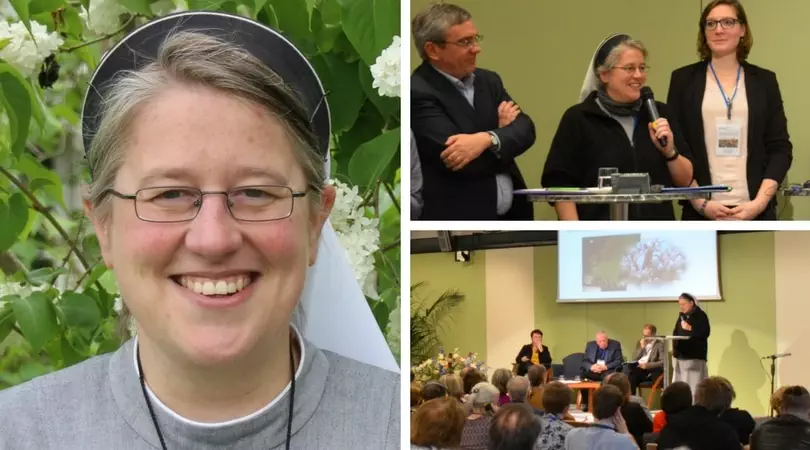
by Sr. Nicole Grochowina | Apr 4, 2018 | 2018 Europe Day, Experiences, reflections and interviews, News
A short contribution, seen from an historical perspective, to Europe’s religious foundations and their difficulties
„Not only do books have a destiny but terms do too.” These are the opening words of the extensive History of the West (Geschichte des Westens) published in 2009 by historian Heinrich Winkler. And although Winkler is specifically unpacking the term “the West”, he simultaneously presents arguments which form a basis for reflecting on Europe. The fact that terms and their meanings change can either be comforting, threatening or even a sign of hope which is precisely what is currently happening in Europe. It is therefore worth taking a closer look at his ideas.
Winkler also makes fundamental and noteworthy observations about Europe. Firstly, he states that Europe is still most strongly characterised by its religious nature. This might come as a surprise in view of lay and secular developments but secularisation on this scale can only be understood as a reaction to powerful religious influences which were marked by differences according to divine and temporal order right from the start. This is the historical context in which Europe was born even if Europe’s religious history was consequently one of division.
Secondly, Europe has never gone forward in a linear way. Rather than being a story of uninterrupted success, Europe is a story of fractures, destruction, new beginnings and the perennial dream of a single community of shared values. This community first emerged through “transatlantic collaboration” as Winkler calls it for there can be no Declaration of Human and Civil Rights without the 1776 Declaration of Rights. The perspective is therefore broad.
Thirdly, Europe is also characterised by the “contradiction between the normative project and political practice” (Winkler, 21) which is why its revolutionary goal of freedom and equality was not achieved at the same time. This is ultimately still an ideal today.
What are the consequences? The consequences are either to abandon the revolutionary project of freedom and equality – or to adhere more strictly to its main features. Winkler argues that Europe can “do nothing better to spread its values than follow them itself and be self-critical about its own history which broadly speaking was a story of its own ideals being violated” (Winkler, 24) and still is. This also means: ad fontes! What are the origins of this dream, this revolutionary project – and how can we pursue the dream today? And do spiritual communities and movements have a special part to play?
Sr. Nicole Grochowina
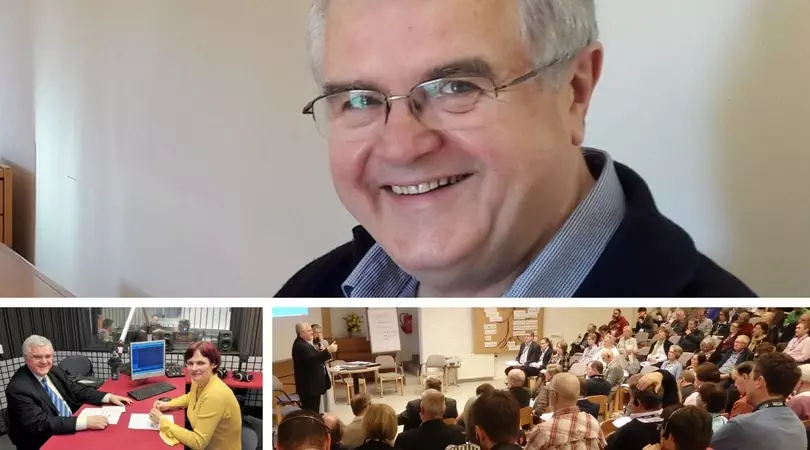
by Pal Toth | Apr 4, 2018 | 2018 Europe Day, Experiences, reflections and interviews, News
The following text has been published to facilitate those who for “Together for Europe Day”, to be held on 9th May, are considering leading a Round Table discussion aimed at opening up dialogue in “diversity”. Examples might include dialogues between East and West, North and South, or dialogues between members of different Churches, or between believers and non-believers, indigenous and refugees etc…
Europe’s diversified composition
To frame the European situation well, it is useful to bear in mind its geopolitical and cultural reality.
Western Europe is mainly a socio-political concept and it specifically identifies the European countries of the “first world”, the result of a multi-century political, economic, and cultural path, different from the Eastern European one. Today, the term Western Europe is also commonly associated with liberal democracy, capitalism, and even with the European Union, despite the latter’s inclusion of Eastern European countries. Most of the countries in the Eastern regions share the very Western culture that seems to be undergoing a crisis today. And there are differences and tensions within the West as well, for example between the North and the South. Or, let us think of the Church of England, which after Brexit will surely not want to leave Europe but intensify its relations with it.
Eastern Europe is rather a geographical concept, an area articulated by different traditions and problems within its borders. Culturally, it can be largely distinguished between Central Europe, the Balkans, and the former Soviet Union countries, and religiously speaking, between the Catholic-Protestant and Orthodox spheres, with consequences on thoughts and actions of its peoples. The common denominator are the post-communist conditions characterized by the social and political troubles of a difficult path to democratization. With the extension of the EU to some Eastern countries, new member States are rapidly adapting to the Western economic and legal system, while cultural approaches are much slower.
Building a culture of encounter before anything else
To achieve a fruitful dialogue between East and West, it is necessary to proceed in degrees and not face problems head-on. According to the Together for Europe journey, condensed in 18 years of experience, and densely expressed in the great event in Munich in 2016, it is necessary to shy away from an attitude of criticism and defense, and promote a culture of encounter, mutual acquaintance, and reconciliation.
Over the last few centuries, the East has looked at the West as a cultural and political model and has developed an understanding of what happens in Western countries, while Eastern Europeans often are painfully faced with the Westerners’ lack of knowledge, and the subsequent misunderstandings. Without Westerners acknowledging the values of the East, there can be no equality or reciprocity. So, we need humility, trust, knowledge, and mutual acceptance.
Consequently, I think that, as a first step, we should promote a culture of encounter, create a platform, a “home” where dialogue is possible. At this stage we could also reflect on our cultural traditions and different reasonings, to prepare for constructive dialogue.
Extract from a talk by Pál Tóth “Culture of encounter and the dialogue between Eastern and Western Europe”, Meeting of ‘Friends’ of Together for Europe – Vienna, 10th November 2017
Download the full talk >
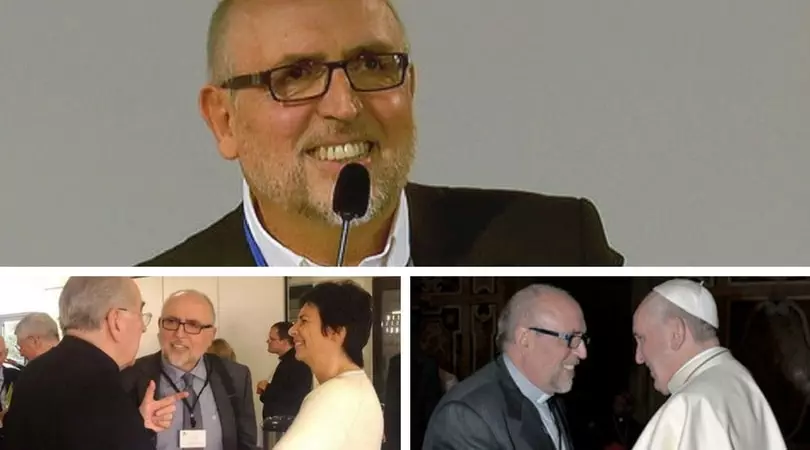
by Jesus Moran | Apr 4, 2018 | 2018 Europe Day, Experiences, reflections and interviews, News
Jesús Morán is the Co-President of the Focolare Movement: Degree in Philosophy, Doctorate in Theology. Here are his stimulating thoughts, condensed into 7 points, to learn the “language of fraternity”
1. Dialogue is always a personal meeting. It is not about words or thoughts, but about giving our being. It is not just conversation but something that intimately affects the participants. Rosenzweig used to say: “Something really happens in authentic dialogue”. In other words: you do not leave a true dialogue unscathed, something changes in us.
2. Dialogue requires silence and listening. Silence is fundamental for sincere thinking and speaking. A deep silence, patiently cultivated in solitude and put into practice in front of others, of their way of thinking and speaking. A Hindu proverb says: «When you speak, make sure that your words are better than your silence». Benedict XVI said that today more than ever we need, “an ecosystem that knows how to balance silence, words, images and sounds”. In the exercise of dialogue we need silence, so as not to destroy the words themselves.
3. In dialogue we put ourselves at risk, our vision of things, our identity, our culture. We must conquer an “open identity”, which is mature, and at the same time based on a fundamental anthropological axiom: “When we understand each other, I understand better who I am”. Paraphrasing an idea of Klaus Hemmerle: if you teach me your thinking, I can learn my way of announcing again.
4. Authentic dialogue has to do with the truth. But beware: truth is a relational reality (not relative, which is different). It means that the truth is the same for everyone, but everyone shares his personal participation and understanding of the truth with others. So the difference is a gift, not a threat. “The gift of difference” is another pillar of the culture of dialogue.
5. Dialogue requires will. Love of the truth leads me to look for it, to want it, and for this reason I open myself up to dialogue. Sometimes it is thought that to dialogue is weak. In reality it is the opposite: only those who have great willpower take the risk of dialogue. Every dogmatic or fundamentalist attitude hides fear and fragility. We must be wary of those who habitually resort to screaming, to using high-powered words or disqualifying sentences to impose their convictions. Brute force, even on a dialectical level, can win, but never convince.
6. Dialogue is only possible between authentic people. Love, altruism and solidarity prepare people for dialogue by making them authentic. Gandhi and Tagore had a very different idea of the educational system to be established in an independent India, but this did not hinder their friendship. Pope Wojtyla and President Pertini had, over a long period, a deep understanding of the destiny of humanity, yet they adhered to almost opposite categories.
7. The culture of dialogue knows only one law, that of reciprocity. Only in this does dialogue find meaning and legitimacy. If nations were to engage in dialogue before the silent killing of revenge or wealth or personal affirmation, we would enjoy the happiness of which we now deprive ourselves. If religions were to dialogue to honour God; if nations respected one another and understood that their wealth is in making the other rich; if everyone went through a “little personal path” of novelty, we could leave behind the night of terror in which we reel. What are the obstacles on such a path? Judgment, condemnation, intellectual pride.
The work to be done is painstaking because of the commitment it requires, avoiding distraction or compromise, but it is full of culture, much more than a profession. It is a tiring and ruthless activity. But Mercy will save us.
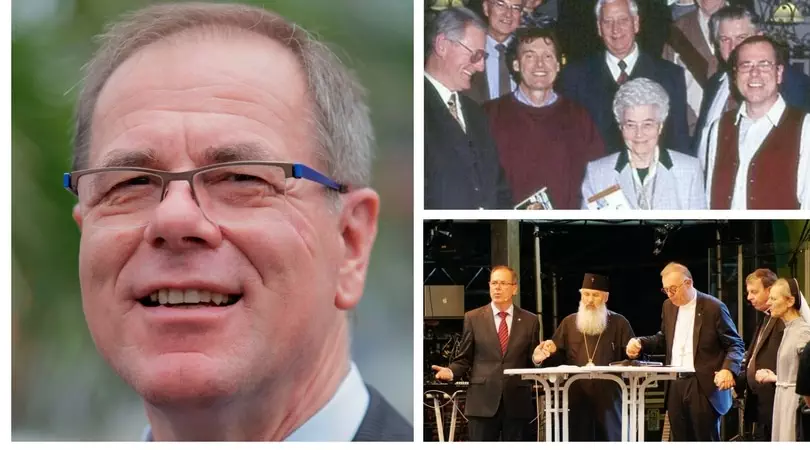
by Gerhard Pross | Apr 4, 2018 | 2018 Europe Day, Experiences, reflections and interviews, News
Since its inception 18 years ago the mandate of Together for Europe has been to work for the unity of God’s people. The second mandate is the social dimension of Together for Europe. This mandate is presented with a new challenge today in view of the current crisis in Europe, namely to live constructive, long-term “togetherness” in cultural and national diversity in Europe.
Unity is possible
At the Congress of Together for Europe in 2007 Br Franziskus stated that “Unity and diversity have the same origin.” [1] Piero Coda said something very similar: “If God is Trinity, unity and diversity are not only not a contradiction but also of the very same origin.” [2] From the very beginning we identified with an image of unity which explicitly acknowledges and affirms the diversity given to us by God. Smoothing over differences endangers identity and can lead to unity in diversity being destroyed in both political and ecclesial circles.
Unity in reconciled diversity
Because of the many divisions between individuals, Churches and peoples, a reconciliation of opposites is needed to reach a reconciled unity in diversity which also applies to cultural diversity. Reconciliation is needed, rather than condemnation and exclusion. This removes the stumbling blocks along the path towards the future because it removes what poisoned our relationships in the past, so that the stranger, the person who is different is no longer seen a threat but as a gift. As people reconciled in diversity, we experience the richness of diversity. Jesus in the midst is the one who unites. He gives us strength and hope for unity in reconciled diversity because Jesus Christ has reconciled the world with God.
“Togetherness” lived as a prophetic sign
Our togetherness in Europe is lived out in practice through our relationships with one another. We set out towards others. “Togetherness” in Europe allows new relationships to be formed, fosters reconciliation and builds a future. It allows something of God’s nature to be revealed by bringing about unity. It is therefore a prophetic sign.
Prayer brings about change
Prayer is part of Together for Europe’s mission. We do not want to deprive this Europe of our prayers. Prayer brings about change. It changes us, it changes the atmosphere in our own country and in Europe, it changes people’s hearts.
Our hope and our “Yes” to Europe
We are committed to Europe because we have understood this as God’s mandate for us. We say a decisive “Yes” to a Europe of unity as well as cultural and national diversity thereby revealing to us a positive image of Europe. We commit ourselves to a culture of “togetherness” based on Christian faith. Our hope for Europe is expressed in 5 “Yeses”.
We say “Yes” to a Europe of reconciliation
A new Europe has emerged from the miracle of reconciliation following the catastrophe of two World Wars. We receive the power of reconciliation from our Christian faith which enables historical wounds to be healed and leads to “togetherness” in diversity.
We say “Yes” to a Europe of unity in diversity
We recognize that we are enriched by diversity. Multiplicity and diversity have the same roots. Both need to balance each other out. We are glad about those who are different and their charisms. This interplay of charisms serves towards the unity of God’s people and the unity of Europe. We advocate a federal Europe. We treat different backgrounds and perspectives with respect and appreciation.
We say “Yes” to a Europe of encounter, dialogue and peace
Mutual understanding grows from encounters. This is one of our main experiences in Together for Europe. We say “Yes” to a Europe that seeks dialogue and chooses the path of negotiating for different interests. The process of the unification of Europe and the EU gave us 70 years of peace within Europe. Anyone who over-emphasizes national interests will evoke the nationalist demons and will lead the way to the destruction of Europe. Anyone who denies national identity, denies diversity and makes it impossible for a European community to be formed. We encourage open political dialogue which promotes a peaceful Europe.
We say “Yes” to a Europe of mercy and humanity.
Christianity has shaped the history of Europe. It is a faith that is open to the world. Humanity and mercy flow from Jesus Christ, crucified and forsaken and are shaping the continent and both are manifested in an unconditional “Yes” to life, “Yes” to marriage and family, “Yes” to the poor and needy.
Europe is more than the Euro, more than a market economy. We therefore advocate a Europe based on its Christianity-Judaic heritage where openness towards those who think differently and live by a different faith is the norm. This is how the “soul” of Europe is being strengthened.
We say “Yes” to a Europe which over the course of history has been called by God [3]:
Its mission is to foster the collaboration between heaven and earth, to impregnate the world with faith, because heaven and earth have met in the Crucified One. Our mission for Europe also entails responsibility for Africa and the Middle East.
The living God has entrusted a lot to our “togetherness” which is why we want to publicly express our “Yes” to Europe in our movements.
Gerhard Proß, Meeting of ‘friends’ of TfE, Vienna, November 2017 (abridged version)
[1] “Together on the journey” ISBN 978-3-00-022045-6, Br. Franziskus Jöst at the 2007 T4E Congress in Stuttgart, p. 21
[2] Piero Coda in “Christian Culture in one Europe” by Hanspeter Heinz [Hrsg], p. 33
[3] P. Lothar Penners at the European meeting of friends in 2016 in Castel Gandolfo with reference to Pater Kentenich
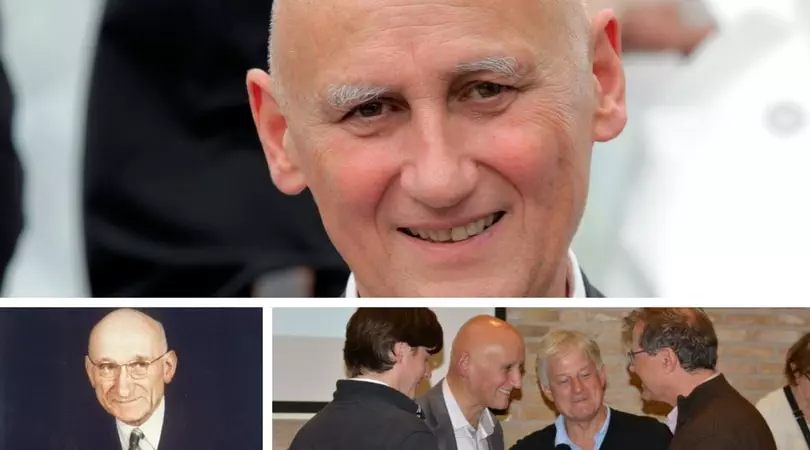
by Gerard Testard | Apr 4, 2018 | 2018 Europe Day, Experiences, reflections and interviews, News
The European Union is an organisation that is often not seen favourably by the public. Politicians not infrequently criticise it, at times in order to defend their own questionable internal politics.
The European Union cannot be said to be without defects (there are many related to standards, complexities, technocracy and detachment from people…).
In spite of this, thanks to the European Union, Europe has lived peacefully for over 70 years. Robert Schuman, one of “founding Fathers of Europe” and at the time the French Minister of Foreign Affairs, launched the European project on 9th May 1950. Schuman was a well-known figure, a practicing Catholic, who showed a deep spiritual life and great moral values. He was the right person at the right time to work towards French-German reconciliation, a ferocious opponent of the spirit of vindication that was primed to remerge. His view in this respect was contrary to the Treaty of Versailles, which put the end to the Great War.
Originally from Lorraine region, born in Luxembourg and brought up in Germany, he maintained his connection to France. He referred to himself as the ‘man of the border’ and had a vision for Europe. He defined his European ideal in a small book written at the end of his life, entitled “For Europe” which was published in 1963, the year of his death. The book contains his talks and describes his European project and his vision of democracy. Below are some quotations which have been taken from this book.
* * *
Quotations by Robert Schuman
Europe will not be made all at once, or according to single plan. It will be built through concrete achievements which first create a de facto solidarity. (Declaration of 9th May 1950)
Following quotations are from Schuman’s book «Pour l’Europe»
“The contribution which an organised and living Europe can bring to civilization is indispensable to the maintenance of peaceful relations.”
“Europe before being a military alliance or an economic entity must be a cultural community in the highest sense of expression”.
“Political unity does not signify the absorption of the nation.”
“Who does not dare to stand up to that which is bad, defends badly that which is beautiful.”
“Democracy owes its existence to Christianity. It was born the day that man was called to realise in this temporary life, the dignity of each human person, in his individual liberty in the respect of the rights of each and by the practice of brotherly love to all. Never before Christ had comparable ideas been formulated.”
“Have we taken the wrong path? The result will to a large extent depend on the calibre of people before us, the extent of their honesty, the understanding we can gain of them and of their followers.”
“May from henceforth this idea of a reconciled, united and strong Europe become a watchword for the younger generations desirous of serving a humanity free at last from hate and fear.”
“Europe will acquire her soul in the diversity of its qualities and aspirations. The unity of these essential conceptions can be conciliated with the plurality of traditions and convictions and with the responsibility for personal choices. The present arrangement cannot and should not remain a technical and economic enterprise. It requires a soul, the conscience of its historic affinities and its present and future responsibilities, a political will serving the same human ideal.”
“Borders maintain their raison d’être if they can elevate their function to a spiritual level. Rather than barriers that divide, they should become the lines of contact where material and cultural exchange takes place.”
With regards to his Declaration of 9th May Schuman has stated that he made it because of his belief in Europe’s Christian foundations.
by Gérard Testard
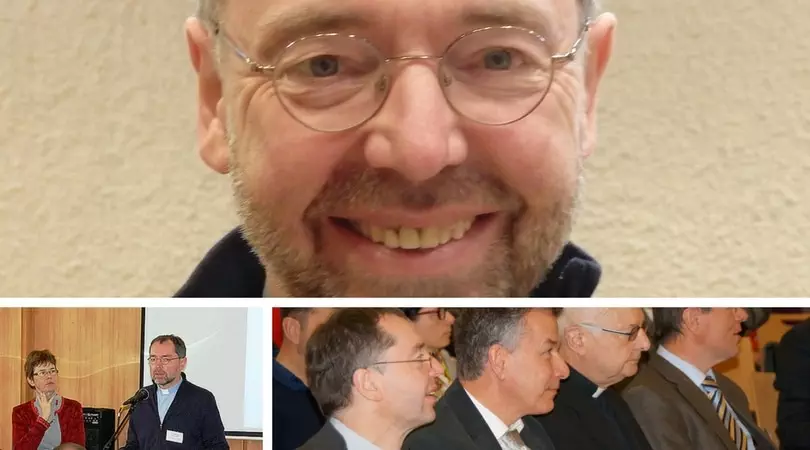
by Matthias Leineweber | Apr 4, 2018 | 2018 Europe Day, Experiences, reflections and interviews, News
When Together for Europe was launched on 31st October 1999 on the day the Joint Declaration on the Doctrine of Justification was signed there was a real sense of hope in the air.
It was an important sign of unity after almost 500 years of division. Various spiritual communities and movements from Protestant Churches and the Catholic Church met in the Ecumenical Life Centre in Ottmaring to consider how this fundamental declaration could be received. This declaration had to become more than mere words. It had to have an impact on everyday life. Karl Barth once spoke of Christians carrying a Bible in one hand and a newspaper in the other.
Over the centuries since the reformation of Martin Luther and other reformers, serious conflicts have arisen from the divisions and disputes between Christians rendering them unable to fully accomplish their mission as instruments of unity and peace. These splits were a sad sign of weakness in the face of dramatic events which reached crisis levels in the 20th century with the outbreak of two world wars and the abyss of the holocaust.
Nevertheless, Christians were still credible witnesses. When John Paul II announced a Great Jubilee for the Year 2000 he spoke of how today’s Church had again become a church of martyrs and more than ever before. According to the Polish Pope who had experienced the oppression of the Church in his own life, this had become an ecumenical phenomenon. Not only because it affects Christian of all traditions but also because the Christians persecuted in the gulags and concentration camps have already had an experience of unity in suffering which needs to be built on. Andrea Riccardi gives a moving account of this story in his book “Salz der Erde, Licht der Welt”.
The historic signing of the Joint Declaration marked the start of a new story of unity and collaboration. In response to so much division and violence that had originated in Europe the movements wanted to help to build a Europe which works for peace, hospitality and openness. Globalisation has brought about unity in economics, money and communications, yet the soul is missing, the unity of peoples and cultures living together peacefully and openly is missing. This is where the movements recognise their vocation, a second vocation to that of their own charism.
We have experienced various episodes in the story of Together for Europe which is now approached its 20th anniversary. There was the euphoria following the introduction of a single European currency and extension of the European Union to former Eastern bloc countries in 2004 which was tangible at the first major congress in Stuttgart. The movements wanted to strengthen and support the process of European unification since, according to the Christian ideals of the founding fathers of European unification which celebrated the 60th anniversary of the Treaty of Rome in 2017, this process needs spiritual foundations. Europe needs a soul as we continue to emphasise.
There is increasing scepticism regarding Europe. There is the alarming tendency towards isolation, walls are being built and Europe is becoming a fortress which ostracises people and turns them away. Much of European society is in the grip of widespread fear which is also affecting Christians. This dangerous fear has led to a rise in pro-exclusion nationalism, xenophobia and antisemitism and the birth of extreme right-wing and fascist movements which are having an increasing influence on European politics.
So the question of our vocation for togetherness needs to be addressed with greater urgency than before. As conflicts increase, Christians and Christian movements need to deepen their togetherness. Our way has always been marked by hospitality and openness. Unity is only possible by being open with, getting to know and welcoming one another. Audacious and prophetic Christians are needed precisely in this phase of history since the current trends in European society today are dangerous and promote violence. And it is the poor, refugees, foreigners and all those who live on the edges of society who suffer.
Europe Day on the 9th May gives us a unique opportunity to highlight the beauty and enrichment of unity. We can show how diversity, openness, hospitality and welcoming the stranger, rather than being a threat, actually represent an enrichment for everyone. Diverse movements were born from the Gospel, each with their own stories, vocations and charism and no-one is taking anything away from them. Quite the contrary. Through meeting one other we have enriched one other and deepened our own charism. This experience is needed more today than 18 years ago in Ottmaring when we started our journey together.
Matthias Leineweber, catholic pastor
«...10...2223242526...30...»






